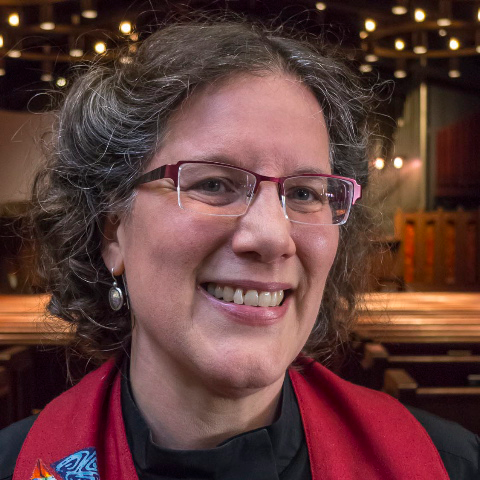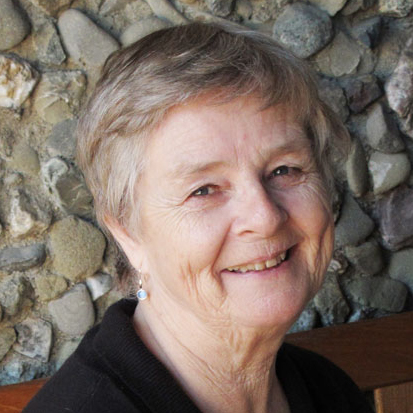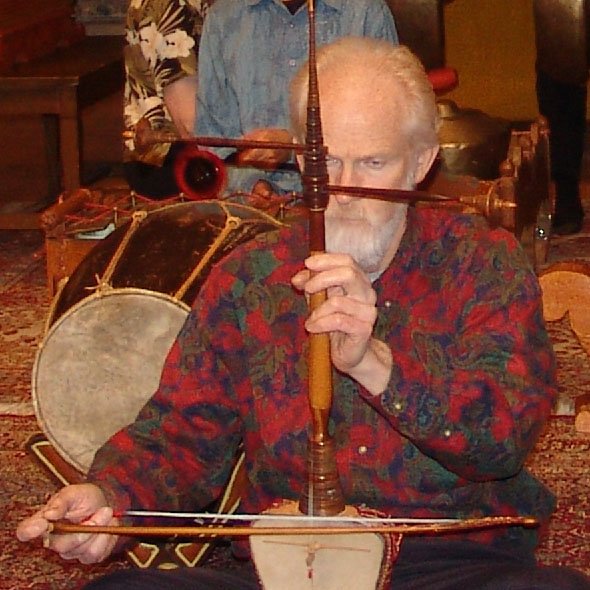I want to tell you the story of Matilda and Bert. Matilda and Bert lived sometime around the great depression in a quaint, small, Midwestern town. They’d been married forever and loved each other. At least they thought they did – until the day they went to the Blue Hill County Fair.
At the fair they come across a young man sitting next to one of those open cockpit airplane with a sign that said: Ride for 2 – $5 dollars. And Matilda said to Bert, “You know I sure would like to take one of those fancy areoplane rides.” To which Bert grumbled, “I don’t think so. Five dollars is Five dollars.” “But Bert,” Matilda said, “I’m 72 years old. I might never get another chance to fly in one of those fancy aeroplanes.” To which Bert again grumbled, “I don’t think so. Five dollars is Five dollars.”
It was at that point that the young man – who was the pilot – having overheard their conversation, piped up. “Tell you what folks. I’ll take the two of you up for an airplane ride for nothing — free — but here’s the catch: ya can’t say nothin’. if I hear even one peep from you while you’re in the air, you owe me five dollars. That means you can’t scream, or yell or even gasp… if you do, you pay full price.” Well that sounded like a bargain that even Bert couldn’t pass up and so Matilda and Bert climbed into the plane.
Well, the pilot was pretty confident he could get the old couple to scream and he tried every trick he knew to make that happen. He did steep ascents and dives… he let the plane stall and wove around telephone poles… He did barrel rolls, loop de loops, and spins… But Bert and Matilda didn’t say one single word.
After twenty minutes, the pilot finally accepted defeat and brought the plane in for a landing. And while they were taxiing down the runway, he turned around to Matilda and said, “Well, I guess you got that plane ride for free. I did everything I could to get you to say something, but I didn’t hear even one peep.” To which Matilda replied, “Well, I was going to say something when Bert fell out of the plane… But then again, five dollars is five dollars.”
I told you that story so I could tell you this story. About a little boy who got up from the table where his older brother and mom sat, to go back to his room. He had a sudden need to count his money. As he walked in to his bedroom, he looked up on the dresser, at the round glass piggy bank. It was the size of a small grapefruit, shaped like a pig, and glass, so he could see how much money was inside. Inside that glass pig was his net worth. It was mostly pennies, which felt a little disheartening. He wanted to feel like he was worth more than pennies.
And he was. In a smaller, less conspicuous wooden treasure box, hidden underneath merit badges and old detention slips, lay the rest of his money. Quarters and dimes he stashed away. A silver dollar he’d gotten for Christmas. And two one dollar bills. It added up to just about five dollars. Not much, but not bad, either, for a seven year old in 1969.
That little boy stood over that small box of money for what seemed like an eternity. He was caught up in a powerful deliberation. A painful, sweating brow kind of deliberation. And although it may sound as though it was a financial deliberation, it really wasn’t. It was a spiritual one.
I know this story well because that little boy was me. I especially remember getting up from the kitchen table where my older brother and my mom were still sitting. We had been talking and the conversation we were having wasn’t finished. The subject, as you might have guessed, was about money. It had to do with how much we had – or rather, didn’t have.
Times were a little tight for us as a family back in 1969. The particular crisis I can’t remember, but there was a whole laundry list of items on the chopping block. And the tone of the conversation was rather serious.
It was a time when my sister had just finished a series of unexpected medical operations. My brother and I were outgrowing clothes like crazy. My parents were newly divorced and my father was already working two jobs to give us as much support as he could. Although we never considered ourselves as poor, we were making decisions over necessities, not luxuries.
The other details sort of blurred together. But this one part I remember clearly: at one point in the conversation, when my mom’s attempt to convey the seriousness of our situation really came through, a deep silence fell between us. It seemed there was nothing left to say.
And just at that moment, my brother got up and left the room. But he returned, just as quickly, holding a small box. My mom and I recognized it right away. It was his wooden treasure box of money; identical to the one I had. Inside was money from birthdays and mowing the lawn, washing cars, recycling coke bottles, Christmas. His box had almost fourteen dollars. He was better at saving his money.
My mom and I both knew what was coming. We braced ourselves. I stared wide eyed, and felt a lump form in my throat. I looked over at my mom and noticed her eyes had begun to well up. A few minutes earlier, she had a lot to say about the money we didn’t have. But, when he took that box and pushed it over in front of her, she suddenly couldn’t say anything. Tears rolled down her face. And she didn’t do anything. She just let him push that box in front of her.
It was me who did something. I got up and headed to my room. I walked straight to my dresser, and looked at my piggy bank. Then I pulled out my own box of money. And I stood there. And I stood there. And I stood there. It was one of the greatest moments of deliberation I’d known. Calculating what was in my box. Five dollars. And what was in my heart.
<><><>
It is the Canvass kickoff today. And I know that a good Canvass sermon always includes a story about generosity. One about being so moved by a brother’s generous example that it inspires his little brother to gather all his money, carry it to the table and offer it up in one selfless act of benevolence and generosity making our poor mother cry. Ending by everyone sitting at the table, holding hands and giving thanks. A real Walton Family moment.
So I guess this isn’t a very good canvass story, because that’s not what happened. Instead, this story is about how I stood paralyzed in my bedroom. Staring into my box. Trying to summon that very benevolence and generosity my brother had just demonstrated but being unable to do so. Being trapped in doubt. And fear. And finally closing the box and mumbling to myself. ‘Well… five dollars is five dollars.’ Finally retreating further into my bedroom… and further into my heart.
It was difficult for me deciding to hold on to that money. But not because anyone berated me, or responded begrudgingly. I don’t think anyone even knew I struggled in that kind of deliberation. The part that was the hardest – that made me feel most lost and adrift – was that I couldn’t even summon the courage to return back to the kitchen table. I couldn’t get myself to follow my brother’s generous example. And I didn’t believe I could show up without it. So, I just stayed in my room. Alone.
It’s time for our annual canvass here at UUCB. It’s time to talk about money. And, perhaps, like some of you, there’s a part of me that wishes it wasn’t. There’s a part of me still feels the trepidation of tender moments past. Mixed feelings from my complicated relationship with money – some experiences remembered with reassurance or pride and some with fear or even shame.
Because of that, there’s a part of me that wishes money wasn’t an issue in religious communities. It’s hard to take matters of the spirit and discuss their financial relevance. To put a price tag on peace of mind…. A dollar amount on what it means to be part of the common good. … Count the cost of belonging to something larger than ourselves… or most of all, the dollar figure attached to learning to live above our fears. I would like to think that everything we do here belongs in the arena of spiritual deliberation. Not financial.
Many of us, if we were honest, find financial conversations to be somewhat awkward. Which is why we hate telemarketers soliciting donations. Why we refrain from walking down streets where we know people have their hat out. Give an extra wide berth when going into the supermarket to avoid that enthusiastic Girl Scout hawking her cookies. And, of course, if we can manage, to skip church on the morning when the canvass sermon is being preached.
But there is also a good reason why we should talk about money. Especially at church. Because there is a crossroads where our spiritual decisions and our financial decisions intersect – and it’s at that intersection we often find the true cornerstone of our faith. And our relationships.
Now, some who pray at the altar of St. Lennon and St. McCartney may argue: ‘money can’t buy you love.’ And we could agree that although money is certainly necessary and useful, love and relationship clearly deserves the greater ranking in our value system. So, why even bother talking about it?
To answer, let me ask a few more questions: Have you ever had to fly across the country to be with someone who needed you desperately? Send flowers to keep a relationship from melt-down? Needed to take your son to the ballgame to see his hero? Have to take your daughter to the emergency room to treat her for a broken leg? Offer one of your children treatment for addiction after they tried to use drugs to mend a broken heart? Ever buy your spouse a coat or a more reliable car because your heart demanded reassurance that they are safe or warm? Are those not decisions of love? And is money not a central issue in each one of those decisions?
Sure, it’s possible to show love, and find love, and offer love, and even make love without it costing a dime. But try to sustain that love over the long haul… in the tough moments and tender spaces of this real world without spending any money… Try to keep love from growing anemic without any budget and you will find it very difficult to keep what connects you to this lovely person or this special place alive and vital. And if you ever have the misfortune of coming across a moment where something you do is construed by a loved one as a preference to love and protect your money over and above loving and protecting your relationship, you will quickly find yourself in the territory of broken hearts and regret.
That may well have been the lesson that Bert and Matilda learned on their five dollar trip in the airplane. Now, maybe it’s just me, but when you fail to call out that your husband just fell out of the plane, there’s not a whole lot of love lost there. Ironically, there wasn’t a whole lot of money lost either.
<><><>
A few years ago, a historian and financial planner named Barbara Wilder wrote a book called “Money is Love”. Her goal was to share the original historical use of money – that it was created to consecrate a covenant between two peoples who were exchanging goods or services. It was intended not so much to protect the goods and services, but to protect the relationship so that trust and fairness prevailed. So that the relationship remained strong and true..
Wilder admitted when she first shared this original concept of money, it was hard for people to swallow. Instead of money being a symbol for relationship and love, it had become a substitute for it.
Money had developed a connotation of distrust. She writes:
“Today, the word, ‘money’ is connected with other words, like ‘loot,’ ‘booty,’ ‘filthy lucre.’ It carries a connotation of ‘excess,’ ‘selfishness,’ ‘greed,’ ‘graft,’ ‘corruption,’ ‘cheating.’
Not trust.
Today, it can feel very confusing to think about money. Do we hold on to it for the reassurance or security it offers? Or do we invest it in something – like relationships or community values – something greater than ourselves – even though those investments are sometimes harder to identify on our list of assets.
Reassurance. Trust. Connection. The feeling of being cared for. Part of something larger. What’s that worth?
<><><>
On that day when my brother pushed all of his money in front of us, I could tell that she wanted very much to tell him to keep it. That she wanted to say we didn’t need it that badly. And the truth is that we didn’t. The truth is that fourteen dollars probably made absolutely no difference to our finances whatsoever. But the larger truth is that it made a huge difference to my brother.
My brother wasn’t giving all his money because we needed it. He was giving it because he needed us. Because he wanted to feel part of something that he knew, deep down, was about love. He gave to feel like he was part of the team, part of the solution, prove that he contributed toward something that really mattered.
And my mom let him because she knew he wanted to know he was worth more than fourteen dollars. The money was just pennies. What it bought was priceless.
The day my brother pushed all of his money towards us, pushed me into a life-long spiritual deliberation. On that day, I couldn’t get myself to go back to the table, I entered a time of self-imposed spiritual exile. To this day, I can’t remember what I did with that five dollars. I have absolutely no recollection. But I spent years wishing for the chance to go back and change that decision. Even knowing the price of freedom – freedom from doubting my own worth – freedom from doubting my sense of belonging and commitment to love and justice – the price of that freedom would cost me everything I had. But, it would have been the best five dollars I ever spent.
<><><>
A few weeks ago, at our annual meeting, we all sat down together. And Linda Laskowski explained – a little like my mom did so many years ago – the seriousness of our financial situation. Unlike my mom, she used PowerPoint. And unlike my mom she charted a trajectory analysis using multiple scenarios.
She explained that doing what we’ve always done will get us where we’ve always gone – which, for the last 15 years is a steady downward trend. A modest increase, she explained, would make a modest difference. But she went on to explain that a true change of our fate would only come with a true change of our heart in the way we saw ourselves in relationship to this community.
More than anyone, Linda knew that the fate of this institution was beyond the power of any one person to change. She knew it would take everyone. But she also knew it must start with someone. So, after great spiritual deliberation, she came back to the table and declared she was all in. She cast her lot with you. Hoping that others – in the final reckoning – would never let her stand-alone – wouldn’t allow what was intended to be a shared responsibility to become a personal sacrifice.
Almost immediately others joined her. Some, like Linda, doubled their pledge knowing that others, at this moment, might only be able to make a modest increase. But together, recognizing that our collective change of fate rests with the community as a whole increasing it’s giving by 20%.
Turns out, it’s not up to me whether this sermon ends with a good canvass story. It’s up to you.
I hope, when your connector calls and you sit down for this spiritual and financial conversation, you feel invited, included, welcome and wanted around this great table.
We will never escape the fact that in this great and noble quest for Love and Justice, the subject of money comes up again and again. Money often decides the size of the table we build, the number of people that get to sit around it and how we offer the Love required to help those who are lost find their way back. Your children – and what they do with this reverse offering – will show you. It is not about judgment or fear or shame. In the end it’s about family, feeling part of it, and knowing we are part of something larger – the common good. It’s about paying the price to discover that what we belong to is priceless.
Blessed be this place. And these people. For showing the way.
To the Glory of Life.

















